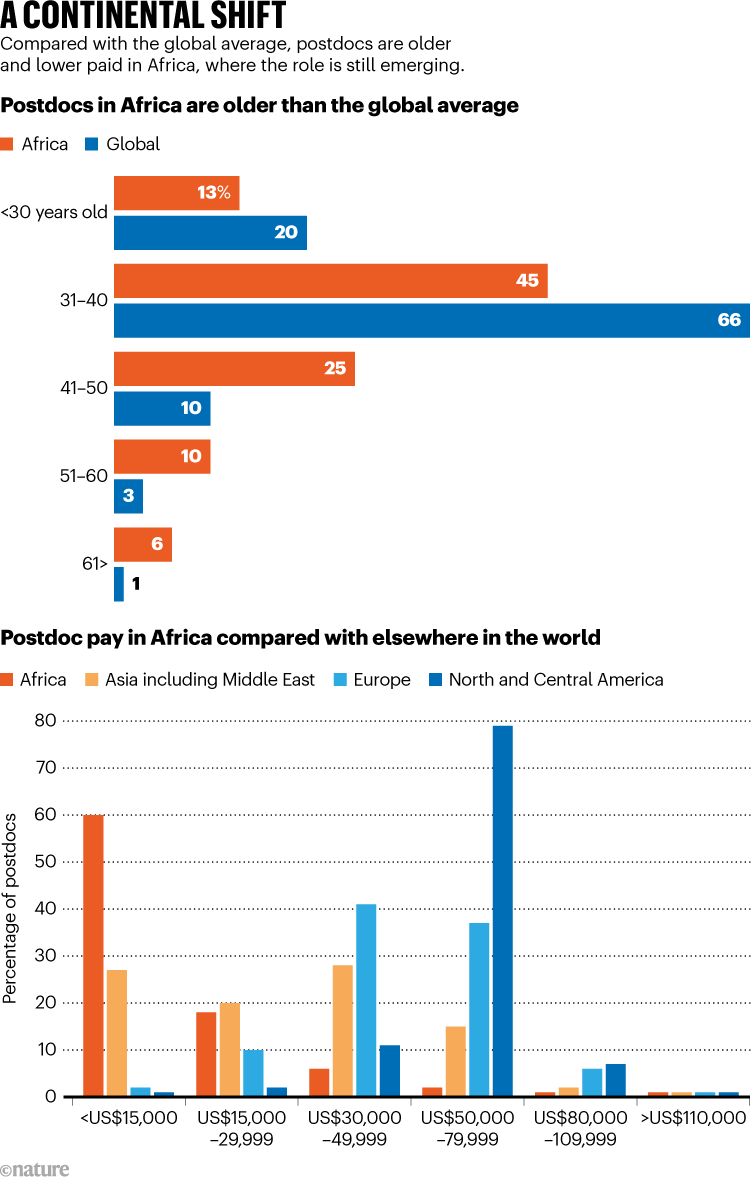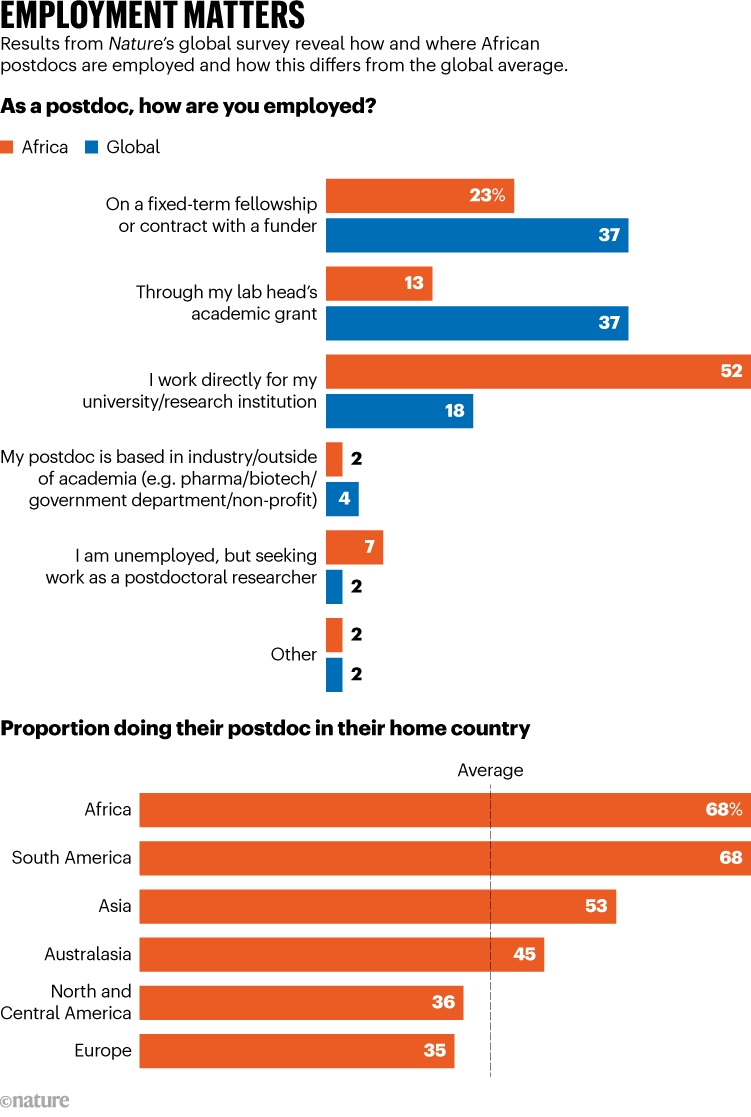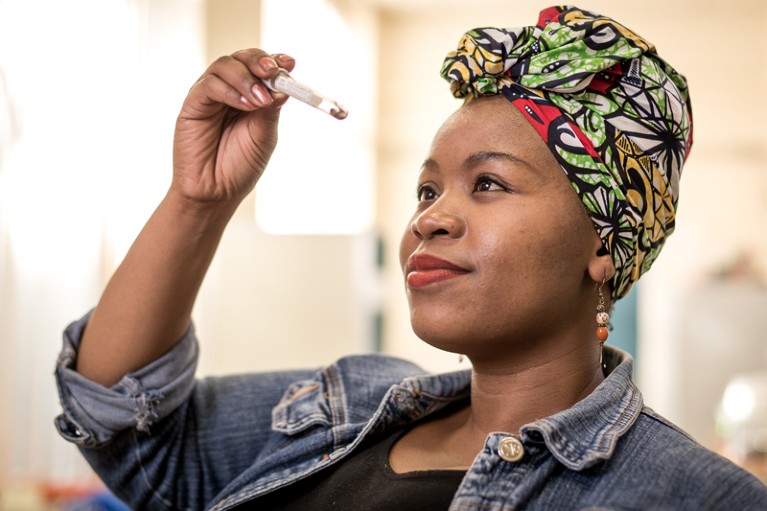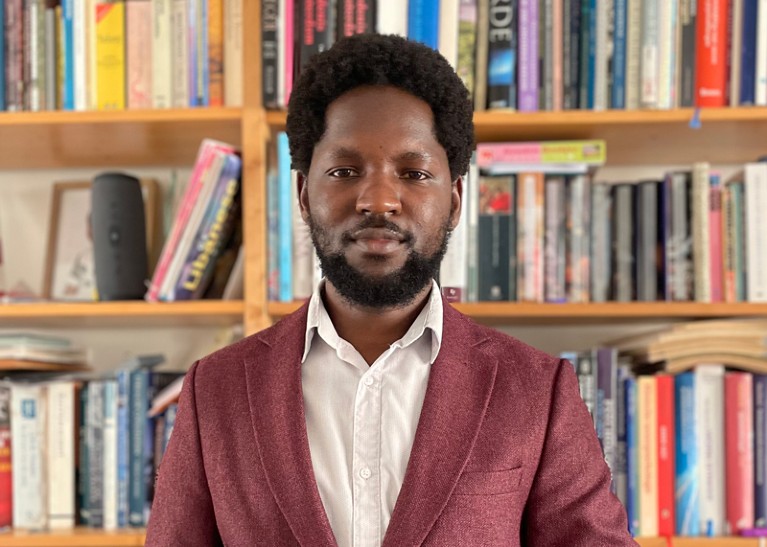
Illustration: Fabrizio Lenci
Lire en français sur Nature Africa
Johnblack Kabukye struggles to explain to his colleagues back home in Uganda why he’s doing a two-year stint as a postdoctoral researcher in Sweden. “If you say you’re doing a master’s or a PhD, it’s clear what that means,” says the digital-health specialist, who worked as a physician for a decade before switching to research. But a postdoc? “It’s not a thing that is understood,” he says.
The skills he’s learning at Stockholm University while building electronic health tools tailored to patients’ needs are certainly useful for his job as a physician and informatician at the Uganda Cancer Institute (UCI) in Kampala. But the postdoc format itself — a short-term position designed to bridge the gap between doctoral student and tenured academic — makes little sense in Uganda, where it is common to have a permanent teaching job at a university before even embarking on a PhD.
“I have not heard of a single postdoc opportunity in Uganda,” Kabukye says.
Career resources for African scientists
That could soon change across Africa. The number of people gaining PhDs in the continent is growing, and so is the need for postdoctoral employment. “There is definitely greater awareness of the postdoc position, and more and more postdocs,” says Gordon Awandare, pro-vice-chancellor in charge of academic and student affairs at the University of Ghana in Accra.
But as the continent’s postdoctoral employment needs have grown, so too have fears that the problems created by a proliferation of postdoc positions in other parts of the world — which critics say trap young researchers in a cycle of poorly paid, short-term positions with no job security — could also arise in African countries.
Breaking ground
Postdoc frustration is a recurring theme in studies that look at early-career researchers. Two global surveys of postdoctoral students by Nature, one published in 2020 and the other last year, found that more than one-third of respondents were dissatisfied with their lot. A lack of job security, career-advancement opportunities and funding were the most-cited reasons.
Nature’s surveys underscore the dearth of postdoctoral researchers in Africa. Of the 3,838 postdocs surveyed in June last year, only 91 were based on the continent. The number of respondents (who were self-selecting) were too few, and too geographically concentrated in three countries — South Africa, Nigeria and Egypt — to be viewed as representative of the continent. Yet, they offer tantalizing glimpses of an emerging segment of the global research workforce.
For example, African postdocs were older than the global average, with more than 40% aged 41 or older. They were also more likely to be doing their postdoc in their home country (68% in Africa compared with 39% globally) and they were much less likely, than the global average, to be employed on fixed-term fellowships or contracts (see ‘Employment matters’). Their pay also stands out: 60% said they earned less than US$15,000 per year — the lowest option survey-takers could tick, and a fraction of what most postdocs are paid in Europe and North America. Lower costs of living play some part in the lower salaries, but not enough to justify the gap (see ‘A continental shift’).

Postdocs in Africa were also more likely to report having a second job alongside their postdoc than were other respondents, on average (33% of respondents in Africa, compared with 10% of respondents overall). The most common reason was to provide extra income (71%), while 57% said their second job gave their skills and career prospects a boost. However, notes Awandare, the tendency of many African postdocs to have permanent academic positions before becoming a postdoc could be a confounding factor in this measure.
Yet, and perhaps surprising given their low pay, Africa-based postdocs were the most optimistic about their futures of all respondents from the geographical regions represented. Overall, 64% of Africa-based respondents reported that they felt positive about their future job prospects, compared with 41% globally. Postdocs in Africa were twice as likely to say that their postdoc roles were better than they imagined (25% compared with 12% overall). And 42% of respondents in Africa felt that they had better prospects than previous generations of postdocs, far exceeding the 15% global average.

That optimism makes sense to Awandare, who thinks that postdocs in his country might feel more important than do their peers who work in large laboratories overseas. In addition to his leadership role at the University of Ghana, he founded and runs the West African Centre for Cell Biology of Infectious Pathogens at the university. He says postdocs at the centre are treated the same as faculty members. “In some advanced institutions, they wouldn’t get that recognition and status,” he notes.
And even though their salaries are low by international standards, postdocs at his centre can be better paid than entry-level permanent university staff who only teach, he says. This is because postdocs tend to be paid out of lucrative international grants. “Ten to fifteen years ago, many of these positions would have been overseas — but now funders, to their credit, increasingly provide positions on the continent,” he says.
A different set-up
Employment structures also differed between Africa and the rest of the world, according to Nature’s survey. Although similar proportions of postdocs were employed in academia in Africa as they were globally (around 90%), the proportion of part-time postdocs was higher in Africa — 12% compared with the global average of 5%. One of them is Felista Mwingira, a parasitologist at the University of Dar es Salaam in Tanzania. She exemplifies how African early-career researchers have been forging ahead in their research careers in the absence of a formal structure of postdoc positions.
Mwingira obtained her PhD in 2014 from the University of Basel in Switzerland at the age of 33 — which she says is very young for researchers in Tanzania. By the time she started her studies, she was already permanently employed by her university in Tanzania, and was able to return to that post after finishing her PhD. Back home, she could take three months paid maternity leave for each of her two children, born four years apart. And although juggling pregnancies and bringing up children with the demands of an academic career was a challenge, it meant she had job security — something postdocs at the same stage in their lives in other parts of the world often lack.
Falling behind: postdocs in their thirties tire of putting life on hold
Mwingira’s work after her PhD was not technically a postdoc. But as her children got older, she sought out a mentorship arrangement at her university that provides her with research training and, sometimes, extra money from the projects she works on. It’s not a formal postdoc, but she hopes it will help her to attain the publication ‘points’ required in the Tanzanian university system to progress up the academic career ladder — something that does not depend on more-senior positions becoming available. She hopes to be promoted in the near future, but says she would also like to embark on a full-time postdoc position to “sharpen my scientific skills”.
So far, Mwingira considers herself lucky. Her children are now four and eight, and while she says that her life as an early-career academic still has ups and downs, she is thankful for the stability she has enjoyed so far in her career. “I think that I’m better off compared to postdocs in high-income countries.”
That feeling of being better off than people elsewhere certainly does not translate to sub-Saharan Africa’s most prominent research nation: South Africa. There, postdoc numbers have been rising for a couple of decades, growing from around 300 in 1999 to nearly 3,000 in 2019 (ref. 1), and national surveys reveal postdoc frustrations that mirror those raised globally, with some country-specific gripes to boot.
Heidi Prozesky is a research scholar at the Centre for Research on Evaluation, Science and Technology at Stellenbosch University. She is one of the people behind South Africa’s first PhD tracer study, published in its final form in July 2023, which tracked the whereabouts of nearly 6,500 PhDs who had graduated in the country between 2010 and 2019. That survey found that around 20% had accepted at least one postdoctoral fellowship, either at home or abroad, on completing their PhDs, with a steady growth seen over the two decades. The postdocs spent a median of three years in the position, although one-quarter reported spending more than four years. One-third reported having accepted more than one postdoc — often, they said, because other work was not available.
Career resources for postdoctoral researchers
A common refrain in the South African survey, which echoes the findings of Nature’s global surveys, is that postdocs feel like they are in limbo: neither students nor staff. In reality, postdocs in South Africa are technically students. This saves them from paying tax on their income, which are stipends, not salaries. But this designation also breeds resentment, because it means postdocs are treated like students: they can’t apply for grants and typically have no funding to travel to conferences or attend workshops.
In addition to the lack of opportunities, postdoc pay in South Africa is low compared with living costs. Last year, the National Research Foundation’s non-taxable postdoc stipends started at 200,000 rand (US$10,700). Female postdocs are allowed up to four months paid maternity leave. However, basic private medical insurance does not come as standard, meaning that postdocs have to pay for it out of their stipends if they want to avoid state health care, which many people in South Africa view as woefully inadequate. The stories of some postdocs “would make you cry”, says Palesa Mothapo, who heads research support and management at Nelson Mandela University in Port Elizabeth, South Africa. “These people have PhDs. And they end up going hungry.”
Growing pains
South Africa’s predicament stems partly from bottlenecks in the academic careers system. The number of people with a PhD graduating annually more than tripled between 2000 and 2018, increasing the demand for postdoctoral work. Postdoc positions have also increased, but further up the career ladder, the number of roles has been static. A study published this year1 in the South African Journal of Science found that the number of postdoc positions grew ten times faster between 2007 and 2019 in the country than did the growth in entry-level permanent jobs in academia.

Palesa Mothapo at Nelson Mandela University in Port Elizabeth, South Africa, says there needs to be more discussion around transferable skills for African postdocs.Credit: Stefan Els
But many also view South Africa’s postdoc malaise as a consequence of incentive structures in the country that place a premium on research publications. Postdocs have become cheap, low-commitment hires for universities that want to boost their output of research publications, which in South Africa earn the host institutions or departments cash subsidies from the government. Postdocs often have publication targets written into their appointments, Mothapo says. “But those papers don’t translate to money for the postdoc. It goes to the institution, to the host.”
There is some cause for cheer. Last December, the National Research Foundation announced it would raise its minimum annual postdoc stipend to 320,000 rand per year for new fellowships from 2024. But simply increasing postdoc stipends is unlikely to create more academic positions for postdocs who are looking for more job security. And the bottleneck seems to be worse for some groups. According to Prozesky, South Africa attracts a lot of postdocs from the rest of the African continent. Most come with the expectation that it will lead to a permanent job. The PhD tracer study found that many people from the rest of Africa end up disillusioned and feeling discriminated against. They struggle to move on from the postdoc status, and can face long delays in visa approvals when moving between posts. “They call it academic xenophobia,” says Prozesky.
Charles Teta, a Zimbabwean environmental chemist who did two postdocs in South Africa after a PhD in his home country, says that he noticed that South African citizens were less likely to take the postdoc route than were immigrants like him. “South Africans are more likely to get lectureship posts,” without having any postdoc experience, he says. In addition, a growing number of funding streams are not open to non-citizens — even those who are permanent residents. Eventually, those restrictions cause people to leave, he says.
Teta left South Africa last year to cover the maternity leave of an environmental-science lecturer at Queen Mary University of London. There, he enjoys the opportunity to teach — something he wasn’t expected to do during his postdocs. It’s been a happy choice so far, and he hopes to find another, similar position when his current one ends. He doesn’t miss the research treadmill, which, he says, “did not translate to mental and financial well-being”.
A call for creativity
Mothapo says that the rigid focus on research in South African postdoc roles is part of their problem. “The universities are not creative,” she says. Because postdocs are limited in how they can teach, and can’t apply for their own funding, she notes, they are missing out on learning skills that are beneficial for staying in academia, and that could open up alternative career paths in industry.
More-creative programmes have been trialled across the continent. Since 2019, the US National Institutes of Health (NIH), the Bill & Melinda Gates Foundation in Seattle, Washington and the African Academy of Sciences have been running the African Postdoctoral Training Initiative (APTI). The programme combines a two-year postdoc at a NIH institute in the United States with a two-year research grant that fellows can take back home to build their own research programmes. Notably, it is open only to researchers who have permanent positions already.
Postdoc career optimism rebounds after COVID in global Nature survey
Daniel Amoako-Sakyi, an immunologist at the University of Cape Coast, Ghana, embarked on an APTI fellowship in late 2023. He is a postdoc in mid-life, and the fellowship has proved to be a good fit. He is a few months into his position at the National Institute of Allergy and Infectious Diseases in Bethesda, Maryland, where he will spend the next two years looking at biological reasons for the variance in efficacy seen in new malaria vaccines. His 15-year-old daughter has enrolled in a US high school, and his spouse, a fellow academic, aims to split her time between the United States and Nigeria.
In Bethesda, Amoako-Sakyi has none of the resource constraints that limit him in Ghana. Antibodies that would take months to ship to his home country arrive on his doorstep overnight. He expects the opportunity will supercharge his career, and hopes he’ll be able to take on some postdocs of his own when he returns home. He doesn’t expect it will be difficult to find them. “I think most researchers are looking for the right environment to flourish,” he says.
What comes next?
There are few certainties about the future of African postdocs. Those who spoke to Nature hope that their postdoc training will accelerate their careers — by helping them to win grants, get promotions and expand their research networks. In Uganda, Kabukye hopes to have organized funding and collaborators by the end of his postdoc so that he can carry on his research designing and implementing digital-health tools in resource-constrained settings. “Ideally, I would have positions at the UCI and at another university, to foster collaboration and exchange,” he says.

Physician Johnblack Kabukye from Uganda is doing a postdoc building electronic health tools at Stockholm University in Sweden.Credit: Johnblack Kabukye
However, with most of the continent’s research funding still coming from sources outside Africa — with the exception of a handful of countries, such as South Africa and Egypt — it’s likely that foreign funding will keep driving the creation of postdoc opportunities. And that can mean the positions aren’t always tailored to local needs.
Mothapo says that she often hears research funders talk about the need to create more postdoc positions. However, there is not enough discussion around the particular needs that African postdocs will have, especially the transferable skills that they will need if they want to transition to sectors such as industry. “I’m worried about their destinations,” she says.
Mwingira echoes her concern. She thinks that more formalized postdocs in Tanzania could lead to bottlenecks in the training system, as has been seen in South Africa and elsewhere. “Those problems will arise in Tanzania, too, but worse, because of the low salaries,” she says.
But Amoako-Sakyi does not think that the creation of more African postdocs has to result in frustration as they compete for rare academic posts. Many might already be employed by universities at that point in their careers. A postdoc could allow them to win grants from funders so that they can set up their own research groups and create opportunities for the next generation. He also thinks that the biotechnology industry in countries such as Ghana will grow, further increasing the demand for researchers in the country.
Nor does Amoako-Sakyi think that African postdocs need to end up in the same negative landscape that postdocs occupy elsewhere in the world. Such fears are not unfounded, he says, because concepts are often brought to the continent and adopted without thinking about the local context. But as his own fellowship shows, there are ways to tailor postdocs to African settings. “We should be very intentional about how we do it and try to correct old mistakes.”

 Career resources for postdoctoral researchers
Career resources for postdoctoral researchers
 Falling behind: postdocs in their thirties tire of putting life on hold
Falling behind: postdocs in their thirties tire of putting life on hold
 Postdoc career optimism rebounds after COVID in global Nature survey
Postdoc career optimism rebounds after COVID in global Nature survey
 Career resources for African scientists
Career resources for African scientists







